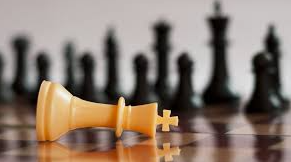Hansie Cronje was the successful captain of the South African national cricket team in the 1990s yet that is not why he will be remembered by most people. He will be remembered because he was banned from cricket for life for his role in a match-fixing scandal in 2000. In a biography about him, it was said that he never lost a rugby match during his six years at Grey College in Bloemfontein – that is an astonishing fact, which will no doubt impress us. However, as one commentator pointed out, in the light of his match-fixing, it might have helped Hansie if he had lost a rugby match at school.
Imagine what it would be like if a Head very proudly announced to the parents of his school that the teachers were only covering half of the curriculum – how would the parents and indeed the pupils feel? Imagine how players and the supporters would feel if a sports coach said he was only going to concentrate on attack (and not defence)? Imagine how a child would feel if we only showed her half a film? There would be uproar! It would appear Hansie Cronje had only done half the curriculum.
It is interesting that the beautiful, if old-fashioned, word ‘winsome’ means ‘charming, attractive, appealing, endearing, engaging’. We should all want to be winsome. And how do we become winsome? It is simple. To become winsome we just need to win some; in other words, we do not win all! If we win everything, we are only doing half the curriculum, winning, yet the curriculum must also include losing. Of course, we do not suggest we go out to lose but we do need to realise that there is as much value in losing as in winning. We cannot only do half the curriculum.
The main reason why it is necessary to lose some (in order to be winsome) is because for the most part people do not learn anything when they win. George Carlin famously said that “No one ever says “It’s only a game” when their team is winning.” Sadly, it is equally true to say that no-one ever asks “Why did we win?” when their team is winning. The fact is that, while we may be good at learning from defeats, we are not good at learning from victory. We tend not to ask questions, and so learn nothing, as we are so excited that we do not stop to reflect for any length of time. We need to stop and consider why we won, because we may have won simply because we were very lucky, because the opposition had a dreadful day, because we happened to score the one chance that we had while the opposition failed to score with the thirty-one chances they had, because our goalkeeper played an absolute blinder this week. We may not have deserved to win but we did; we may have deserved to win but we did not. Some days the team plays badly and wins but other days the team plays brilliantly but loses – they have more chances in one game that they lose than in another game that they win! The winning should not be everything – the learning should be. In his poem called “If” Rudyard Kipling asserted that “If you can meet with triumph and disaster and treat those two imposters the same” you will succeed, you will be a man. That is the real victory.
The second reason why it is necessary to lose some (to be winsome) is because if we win all the time, we will revert to using our greater strength instead of skill or tactics to win, which may be fine against weaker opposition but when we come across a difficult task or team later, we will not know how to handle them. So what if we beat a weaker team? How will we beat a stronger one?
The third reason why it is necessary to lose some is because our character can be affected by whether we win or lose. When we win all the time there is a real danger that we become arrogant and complacent; again, as a result we do not think to learn anything – all we do is celebrate. We should realise that we may win more respect by losing, by the way we lose, than by winning. Furthermore, we may lose respect by winning matches or arguments or elections in the wrong way.
If we are not prepared to lose, we will never win, and we will never be winsome, which is not only half the battle but also half the curriculum. We will not know the value of a win without a loss – that is the whole curriculum. Schools that go all out to be unbeaten are only doing half the curriculum. Winning and losing with dignity, humility, integrity, grace, humanity, respect and sensitivity to others who have lost – such are the qualities of being winsome. If we win some we will become winsome; if we do not lose some we will become loathsome.




